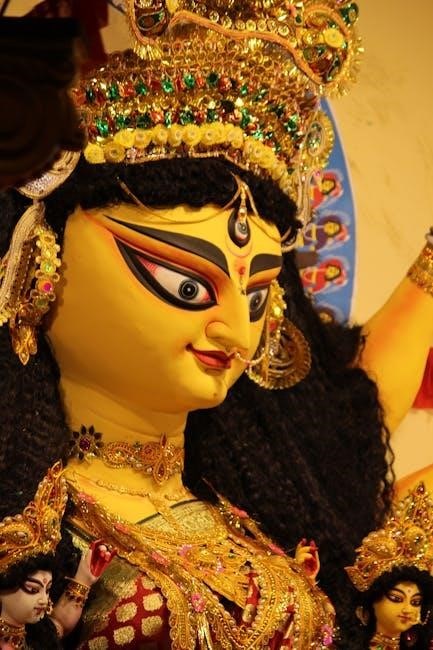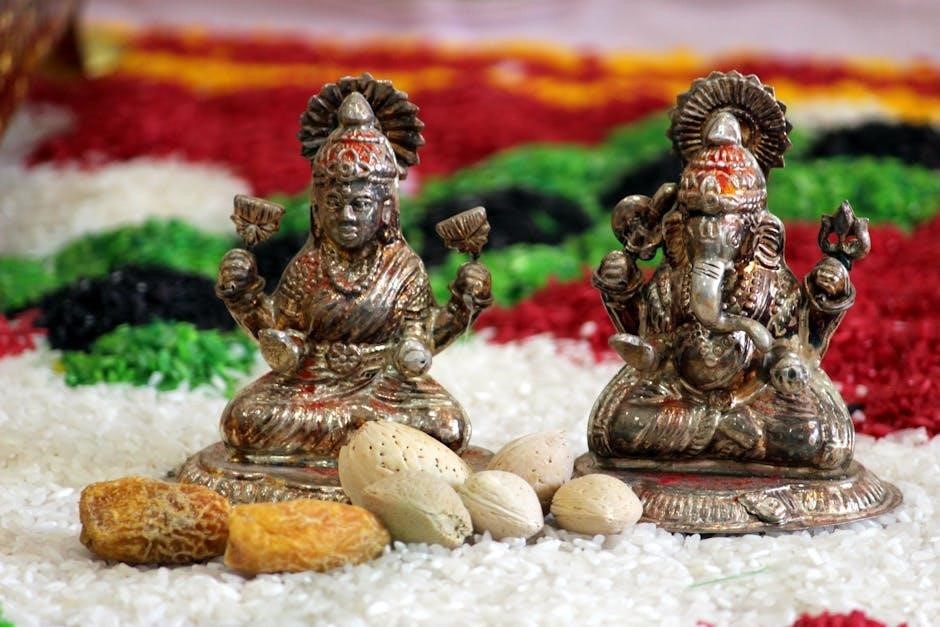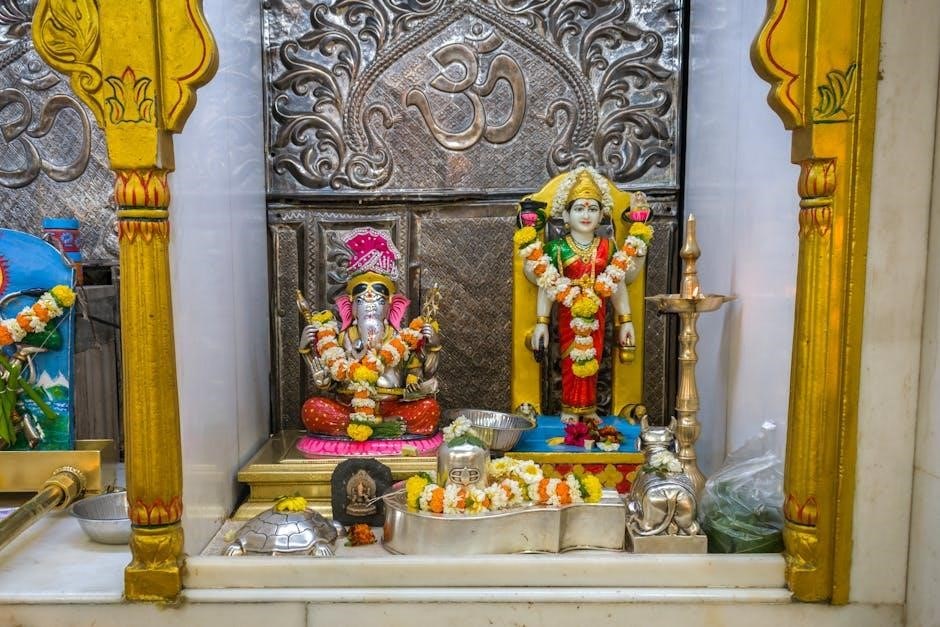The Indra Krutha Lakshmi Stotram is a sacred hymn dedicated to Goddess Lakshmi, composed by Lord Indra, the king of the gods. This stotram is a part of the Devi Bhagavatam, specifically found in the 9th Skandha. It is a powerful prayer that extols the virtues of Goddess Lakshmi, seeking her blessings for prosperity, wealth, and spiritual growth. The stotram is known for its melodious verses and deep spiritual significance, making it a popular choice for devotees. It is often recited during auspicious occasions and is believed to bring good fortune and protection. The stotram is widely available in Telugu PDF format, making it accessible for devotees to recite and worship. Its recitation is considered a means to connect with the divine energy of Goddess Lakshmi.
1.1 Overview of the Stotram
The Indra Krutha Lakshmi Stotram is a devotional hymn dedicated to Goddess Lakshmi, the embodiment of wealth, prosperity, and divine energy. This stotram is a beautiful composition that praises the glory of Goddess Lakshmi and seeks her blessings for a fulfilling life. It is a significant part of Hindu spiritual literature and is widely revered for its ability to bring peace, prosperity, and protection to those who recite it with devotion.

The stotram is composed by Lord Indra, the king of the gods, who is said to have sung it in reverence of Goddess Lakshmi. It is mentioned in the Devi Bhagavatam, a sacred text in Hinduism, specifically in the 9th Skandha. The hymn consists of 29 verses, each rich in spiritual significance and poetic beauty. These verses are written in a melodious and rhythmic style, making them easy to recite and remember. The stotram is often recited during religious ceremonies, festivals, and daily worship to invoke the blessings of Goddess Lakshmi.

The Indra Krutha Lakshmi Stotram is unique because it is composed from the perspective of Lord Indra, who seeks forgiveness for his past mistakes and pleads with Goddess Lakshmi to restore his wealth and glory; The stotram highlights the divine attributes of Goddess Lakshmi, such as her compassion, grace, and power to bestow prosperity. It also emphasizes the importance of surrendering to her divine will and seeking her guidance in all aspects of life.
The stotram is written in Sanskrit, but it is widely available in Telugu PDF format, making it accessible to devotees who prefer to recite it in their native language. The Telugu version of the stotram is equally revered and is often downloaded and shared among devotees for its ease of use and readability. The PDF format allows devotees to carry the stotram with them and recite it at their convenience, whether at home, in temples, or during religious gatherings.

Each verse of the stotram is designed to evoke a deep sense of devotion and connection with Goddess Lakshmi. The hymn begins with an invocation of her divine presence, followed by praises of her attributes and a heartfelt plea for her blessings. The stotram also includes verses that express gratitude for the blessings already received and seeks protection from adversity. The overall tone of the stotram is one of humility, reverence, and surrender, making it a powerful tool for spiritual growth and self-reflection.
1.2 Importance of Lakshmi Stotram in Hindu Spirituality

The Indra Krutha Lakshmi Stotram holds a significant place in Hindu spirituality, particularly among devotees of Goddess Lakshmi, the divine embodiment of wealth, prosperity, and good fortune. This stotram is not just a hymn but a powerful tool for spiritual growth, emotional solace, and material well-being. Its importance is deeply rooted in Hindu religious and cultural practices, making it a cherished text for millions of devotees worldwide.
One of the primary reasons for the stotram’s importance is its ability to connect devotees with the divine energy of Goddess Lakshmi. The hymn is composed in such a way that it invokes her blessings and grace, providing a sense of peace and prosperity in the lives of those who recite it. It is believed that regular recitation of the stotram can bring financial stability, marital harmony, and success in various endeavors. Many devotees recite it during auspicious occasions like Diwali, Navaratri, and other festivals dedicated to Goddess Lakshmi, as it is considered an effective way to seek her divine intervention.
The stotram is also valued for its spiritual significance. It emphasizes the importance of surrendering to the divine will and cultivating a sense of detachment from material wealth. By praising Goddess Lakshmi’s attributes, such as her compassion, generosity, and wisdom, the stotram helps devotees develop a deeper understanding of the transient nature of worldly possessions. It encourages them to seek spiritual growth and inner peace, which are considered the ultimate forms of wealth in Hindu philosophy.
Another aspect of the stotram’s importance is its role in warding off adversity. Many devotees believe that reciting the Indra Krutha Lakshmi Stotram can protect them from misfortune, financial losses, and negative energies. The hymn’s verses are filled with positive vibrations that are believed to create a protective shield around the reciter, ensuring their safety and well-being. This belief has made the stotram a popular choice for those facing challenges in their personal or professional lives.
The availability of the stotram in Telugu PDF has further enhanced its accessibility and popularity. Devotees who prefer to recite the stotram in their native language can easily download and use the PDF version, making it convenient for daily worship or special occasions. The Telugu version of the stotram is equally revered and is often shared among communities, preserving the tradition and ensuring its continuity for future generations.
In addition to its spiritual and material benefits, the Indra Krutha Lakshmi Stotram is also valued for its cultural significance. It is a part of the rich literary and religious heritage of Hinduism, reflecting the deep devotion and reverence that Goddess Lakshmi commands. The stotram’s verses are often sung in temples, homes, and during religious gatherings, creating a sense of unity and shared faith among devotees. Its melodious and rhythmic composition makes it a joy to recite, further enhancing its appeal.

Origin and Background of Indra Krutha Lakshmi Stotram

The Indra Krutha Lakshmi Stotram originates from the Devi Bhagavatam, a sacred Hindu text, specifically from the 9th Skandha. This stotram is an exceptional hymn composed by Lord Indra, the king of the gods, to worship Goddess Lakshmi and regain his lost wealth and prosperity. According to mythological accounts, Indra faced a period of misfortune and impoverishment, which prompted him to seek the blessings of Goddess Lakshmi through this stotram. The hymn is deeply rooted in Hindu mythology and is considered a powerful means to invoke Lakshmi’s grace. Its verses are filled with devotion and reverence, making it a significant part of Hindu religious practices. The stotram is widely available in Telugu PDF format, allowing devotees to easily access and recite it for spiritual and material benefits.
2.1 Historical Context and Mythological Significance
The Indra Krutha Lakshmi Stotram holds a profound place in Hindu mythology and spirituality, with its origins deeply rooted in ancient scriptures. This sacred hymn is attributed to Lord Indra, the king of the gods, who is said to have composed it in reverence of Goddess Lakshmi, the embodiment of wealth, prosperity, and divine grace. The stotram is a part of the Devi Bhagavatam, a revered text in Hinduism that extols the glory of the divine feminine. Specifically, it is found in the 9th Skandha (section) of the Devi Bhagavatam, highlighting its significance in the broader narrative of Hindu mythology.

According to mythological accounts, Lord Indra composed this stotram during a period of great adversity. Legend has it that Indra, once the ruler of heaven, faced a severe loss of wealth and power due to the wrath of a powerful asura (demon). This misfortune led him to seek the blessings of Goddess Lakshmi, who is revered as the bestower of wealth and prosperity. Through his devotion and the recitation of this stotram, Indra was able to regain his lost glory and restore his position as the king of the gods. This mythological narrative underscores the stotram’s power to alleviate suffering and restore prosperity, making it a cherished prayer among devotees.
The Indra Krutha Lakshmi Stotram is also notable for its structure and lyrical composition. It consists of 29 verses, each meticulously crafted to praise the divine attributes of Goddess Lakshmi. The stotram begins with an invocation of the goddess, seeking her grace and protection. It then elaborates on her benevolent qualities, such as her role as the consort of Lord Vishnu, her abode in the heart of the lotus, and her compassion toward her devotees. The hymn concludes with a heartfelt plea for her blessings, emphasizing the devotee’s surrender and faith in her divine will.

Historically, the Indra Krutha Lakshmi Stotram has been a significant part of Hindu religious practices, particularly in South India, where it is widely recited in temples and during religious ceremonies. Its availability in Telugu PDF format has further enhanced its accessibility, allowing devotees to recite it with ease and devotion. The stotram is often chanted during festivals like Diwali, which celebrates the triumph of light over darkness and the divine grace of Goddess Lakshmi.

The mythological significance of the Indra Krutha Lakshmi Stotram is further amplified by its association with the Devi Bhagavatam, a text that glorifies the divine feminine in all her forms. The stotram serves as a reminder of the enduring power of devotion and the boundless grace of Goddess Lakshmi. It not only reflects the spiritual aspirations of its composer, Lord Indra, but also resonates with the faith of countless devotees who seek solace and prosperity through its recitation;
In essence, the Indra Krutha Lakshmi Stotram is a timeless hymn that bridges the gap between mythology and spirituality. Its historical context, rooted in the divine narrative of Lord Indra and Goddess Lakshmi, continues to inspire devotion and hope among believers. As a testament to the power of faith and prayer, this stotram remains an integral part of Hindu religious traditions, offering solace, prosperity, and spiritual enlightenment to all who recite it with sincerity and devotion.
